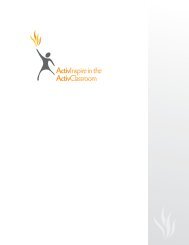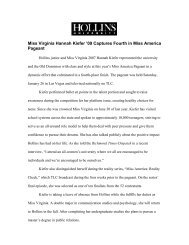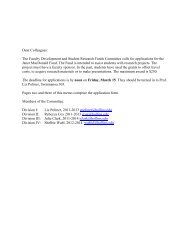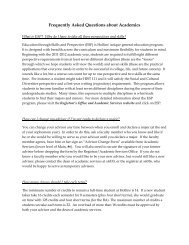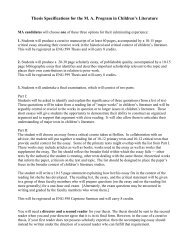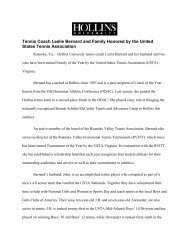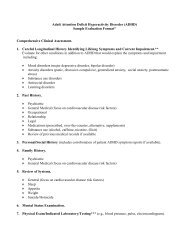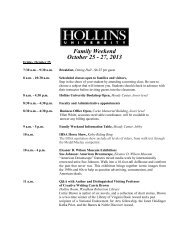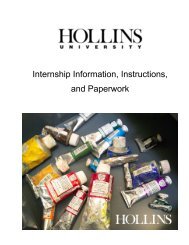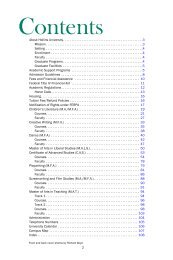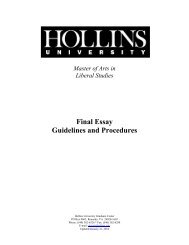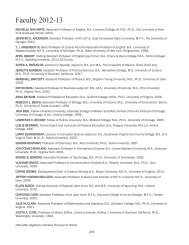Green and Gold Memories from the Class of 1932 - Hollins University
Green and Gold Memories from the Class of 1932 - Hollins University
Green and Gold Memories from the Class of 1932 - Hollins University
- No tags were found...
You also want an ePaper? Increase the reach of your titles
YUMPU automatically turns print PDFs into web optimized ePapers that Google loves.
<strong>Green</strong> <strong>and</strong> <strong>Gold</strong> <strong>Memories</strong> <strong>from</strong> <strong>the</strong> <strong>Class</strong> <strong>of</strong> <strong>1932</strong>In spring 2007, as <strong>the</strong> class <strong>of</strong> <strong>1932</strong> approached its 75th reunion, Ca<strong>the</strong>rineSears Towers e-mailed <strong>Class</strong> Letters Editor Marsha Stevens ’92 with anintriguing proposal.Towers reported that her mo<strong>the</strong>r, Ca<strong>the</strong>rine “Kit” Witschen Sears ’32, wasnot going to be able to attend her class reunion. But she added that her mo<strong>the</strong>rhad always enjoyed reminiscing about her <strong>Hollins</strong> days.“I thought that it would be <strong>of</strong> interest, as ‘oral history,’ to get information atthis time <strong>from</strong> those left in <strong>the</strong> class <strong>of</strong> ’32,” Towers wrote. “Mom would do it, Ifeel sure.”The alumnae relations <strong>of</strong>fice mailed each <strong>of</strong> <strong>the</strong> 14 members <strong>of</strong> <strong>the</strong> classa list <strong>of</strong> questions to spark <strong>the</strong>ir memories. Among <strong>the</strong>m: “Why did you choose togo to <strong>Hollins</strong>?” “Who was your favorite pr<strong>of</strong>essor?”We received six written responses, ei<strong>the</strong>r <strong>from</strong> <strong>the</strong> women <strong>the</strong>mselves orfamily members. The sampling for our history may have been small, but itprovided a lot <strong>of</strong> detail, both funny <strong>and</strong> poignant. This class entered <strong>Hollins</strong> in <strong>the</strong>fall <strong>of</strong> 1928, <strong>and</strong> in <strong>the</strong> subsequent four years <strong>the</strong> country’s economic problems<strong>of</strong>ten became <strong>the</strong>ir family’s trials. But Tinker Day continued, students crammedfor exams, <strong>and</strong> <strong>the</strong> girls forged lifetime friendships.—Ann Atkins Hackworth ’82, M.A.L.S. ’95Mildred McIntyre CarmichaelFrom Sally Carmichael Matejka: I am <strong>the</strong> daughter <strong>of</strong> Mildred McIntyreCarmichael, <strong>Class</strong> <strong>of</strong> <strong>1932</strong>. Forgive my taking so long to reply. I kept thinking thatmy Mo<strong>the</strong>r might recall more answers to your questions if I gave her more time.Her vision, hearing <strong>and</strong> memory are all declining. She has been in a personalcare home for about six months <strong>and</strong> will not be able to make <strong>the</strong> reunion. Shereally enjoyed <strong>the</strong> 2002 reunion <strong>and</strong> visiting with her old friend Ted Ellett. Shewould be pleased to see Ted being honored. We also got to meet Dr. Nora Bellboth at <strong>Hollins</strong> <strong>and</strong> during her visit to Pittsburgh. I pulled out my Mo<strong>the</strong>r’s memoirthat she wrote, with a little pr<strong>of</strong>essional help, around 2000. In it she has threepages about <strong>Hollins</strong> that will answer most <strong>of</strong> your questions. Please feel free toedit <strong>and</strong> use any parts <strong>of</strong> this that you like. Please give a copy to Ted Ellett withour love.Attending <strong>Hollins</strong> College: Most <strong>of</strong> my friends were planning on college after highschool even though that was rare for <strong>the</strong> general population in 1920’s Arkansas. Iwanted to go to a good academic school where I could study music. I had littleidea <strong>the</strong>n <strong>of</strong> my family’s (J.F. McIntyre <strong>and</strong> Sons – World’s Finest Oak Flooring)growing financial difficulties because we kept our heads held high, <strong>and</strong> wecontinued to live our lives as before (before <strong>the</strong> working bankruptcy <strong>of</strong> <strong>the</strong> familylumber business because <strong>of</strong> <strong>the</strong> famous 1927 flood <strong>of</strong> <strong>the</strong> Mississippi River).With <strong>the</strong>ir encouragement I applied to <strong>Hollins</strong> College <strong>and</strong> was accepted. I hadnever visited <strong>the</strong> college, but two older girls <strong>from</strong> Pine Bluff that I knew ---Elizabeth Simmons <strong>and</strong> Elizabeth Tripplet ---were freshmen at <strong>Hollins</strong> <strong>and</strong>
ecommended it. In September 1928, my parents sent me <strong>of</strong>f, but <strong>the</strong>y probablyknew that <strong>the</strong>re would be no money for me to finish.I traveled by train with Loraine McGlone, ano<strong>the</strong>r girl <strong>from</strong> my Pine BluffHigh School class.The two Elizabeths, whom we called “Simmons” <strong>and</strong> “Trip,” were starting<strong>the</strong>ir sophomore year. Loraine’s mo<strong>the</strong>r accompanied us as far as Memphis tohelp us change trains for <strong>the</strong> overnight trip across Tennessee to Roanoke,Virginia. All along <strong>the</strong> way <strong>the</strong> train stopped for more <strong>Hollins</strong> students to get on.When we arrived <strong>the</strong> next morning, we were met at <strong>the</strong> station, <strong>and</strong> our trunkswere delivered to <strong>the</strong> East Building, a dormitory for freshmen. There were notenough rooms to go around, so Loraine <strong>and</strong> I shared a room for a month at one<strong>of</strong> <strong>the</strong> pr<strong>of</strong>essor’s houses. Then <strong>the</strong> college managed to convert some <strong>of</strong> <strong>the</strong>irmeeting rooms on <strong>the</strong> first floor <strong>of</strong> <strong>the</strong> West Building, a senior dormitory, int<strong>of</strong>reshmen rooms, so Loraine <strong>and</strong> I shared a room <strong>the</strong>re. Because our floor wasnot originally designed as a dorm, we had an unusually large walk-in closet. After“lights out” we would sneak in <strong>the</strong>re, use a trunk as a desk <strong>and</strong> study into <strong>the</strong>night. I was never homesick at <strong>Hollins</strong>, a beautiful, friendly campus with fine, oldtrees that I longed to climb. The dining hall <strong>and</strong> <strong>the</strong> chapel flanked <strong>the</strong> MainBuilding, <strong>and</strong>, toge<strong>the</strong>r with <strong>the</strong> large library <strong>and</strong> <strong>the</strong> East <strong>and</strong> West dormitories,<strong>the</strong> buildings formed a lovely quadrangle.I studied French, English Literature, Piano, <strong>and</strong> Harmony at <strong>Hollins</strong>. I didall right with English Literature <strong>and</strong> managed to make A’s in French because Ilearned <strong>the</strong> rules, but when we had to start speaking it, I didn’t do as well. Wehadn’t had to do oral presentations in my four years <strong>of</strong> high school Latin. A pianopractice room was reserved for me to use in <strong>the</strong> large music building calledPresser Hall. If my friends couldn’t find me – that’s where I’d be. My music <strong>the</strong>oryteacher, Miss Carpenter, had absolute pitch <strong>and</strong> could immediately correct us ifwe hit a wrong note. I liked my music studies <strong>and</strong> was <strong>the</strong> only freshmanselected to give a recital at a concert at <strong>the</strong> end <strong>of</strong> <strong>the</strong> term (after Christmas). Ispent a lot <strong>of</strong> time practicing <strong>and</strong> didn’t go home during Thanksgiving break.Just before <strong>the</strong> break, I got a letter <strong>from</strong> my parents telling me that <strong>the</strong> family wasreally bankrupt, <strong>and</strong> I would not be able to complete college. I cried when I knewwe had lost everything. Shortly afterward, I was called to <strong>the</strong> President’s <strong>of</strong>fice<strong>and</strong> awarded a Theodore Presser music scholarship so that I could finish myfreshman year. In December, I came down with influenza <strong>and</strong> was sent to <strong>the</strong>college infirmary, but I managed to get better in time to go home for <strong>the</strong>Christmas break. Somehow, I managed to scrape up enough money for <strong>the</strong> trainfare, <strong>and</strong> Loraine shared her Pullman berth with me. I learned at home that <strong>the</strong>rewasn’t anything to be done about our financial problems, so when I returned tocollege on <strong>the</strong> scholarship, I tried to put on a brave front <strong>and</strong> decided to workhard while I still had <strong>the</strong> chance. I practiced hard every day for <strong>the</strong> concert. Iremember that I wore my high school graduation dress <strong>and</strong> played Reinhold’s“The Impromptu.” I was encouraged when I got a curtain call <strong>and</strong> had my namementioned in a college newspaper article about <strong>the</strong> concert.The scholarship allowed me to continue learning harmony <strong>and</strong> attendingconcerts for ano<strong>the</strong>r term. Besides music, I also enjoyed physical education <strong>and</strong>
dance at <strong>Hollins</strong>. We had to fill out a physical education card telling how muchexercise we did each week. Loraine thought we should be able to include <strong>the</strong>required chapel services on <strong>the</strong> exercise card because <strong>the</strong>y were Episcopalservices that required us to st<strong>and</strong> up <strong>and</strong> sit down, a lot. I had never played fieldhockey before <strong>and</strong> ano<strong>the</strong>r athletic freshman we called “Tim” tried to teach me. Idon’t know where she got that nickname. The world knew her as <strong>the</strong> famousauthor Margaret Wise Brown. Later one <strong>of</strong> her nom de plumes was Timothy Hay.I wonder… I especially liked gymnastics <strong>and</strong> swimming. In <strong>the</strong> spring I made <strong>the</strong>top team in gymnastics with a running dive over six crouched students. I couldalways cartwheel all <strong>the</strong> way around <strong>the</strong> gym without stopping. I passed mylifeguard tests in <strong>the</strong> lovely indoor swimming pool. We celebrated May Day in1929 with classic dancing, <strong>and</strong> I was chosen to be one <strong>of</strong> <strong>the</strong> dancers for <strong>the</strong>following year. Then, still hoping to come back in <strong>the</strong> fall, I took my final exams.I didn’t spend much time that summer in Pine Bluff. With my parents’encouragement, I signed on to be a lifeguard <strong>and</strong> swimming instructor at <strong>the</strong>YWCA Camp Ouachita in Saline County, Arkansas When camp was over for <strong>the</strong>summer, friends <strong>of</strong> my parents asked me to stay with <strong>the</strong>m for a week at <strong>the</strong>irfishing camp. They had ano<strong>the</strong>r guest, a young man who was older (by 20 years)than I was <strong>and</strong> was an Olympic swimmer <strong>from</strong> Hawaii. We swam toge<strong>the</strong>r in <strong>the</strong>Saline River, <strong>and</strong> he gave me a few swimming pointers. Decades later on onetrip to Hawaii I saw his statue at Waikiki beach <strong>and</strong> realized how famous mysummer friend really was. Duke Kahanamoku is generally regarded as <strong>the</strong>inventor <strong>of</strong> <strong>the</strong> modern sport <strong>of</strong> surfing, as well as having been <strong>the</strong> world’s fastestswimmer.Then I went to see my first cousin Frances. She had moved <strong>from</strong> Willetts,Louisiana (<strong>the</strong> McIntyre’s Louisiana lumber mill town that was flooded) across <strong>the</strong>river to an antebellum house in Natchez, Mississippi. Aunt Lillian no longer had“help,” but she had always done a lot <strong>of</strong> her own housework <strong>and</strong> cooking, so itwas not as much <strong>of</strong> a hardship for her as for my mo<strong>the</strong>r. Even Frances couldcook. I remember being amazed that she could bake a cake. It never entered mymind to cook something. During that visit to Natchez, I remember I had to wash<strong>and</strong> iron my own clo<strong>the</strong>s. They were a fun-loving family <strong>and</strong> managed all right.Uncle Roscoe had a wonderful sense <strong>of</strong> humor. The family called him “Squilly.”Later, Uncle Roscoe took a job in Memphis <strong>and</strong> moved his family <strong>the</strong>re, <strong>and</strong> AuntLillian went to work for an insurance company.I knew after I left <strong>Hollins</strong> that I had no money to come back, but I thoughtsomehow I would earn enough over <strong>the</strong> summer. My scholarship allowed for twoterms, so I had enough to cover <strong>the</strong> first term <strong>of</strong> my sophomore year but nothingbeyond that. On September 1, 1929, I went down to <strong>the</strong> newspaper <strong>of</strong>fice, <strong>and</strong>Mr. Adams, who was a good friend <strong>of</strong> <strong>the</strong> family, gave me a job at The Graphicselling ads. I can’t remember applying for <strong>the</strong> job. I think it was just sort <strong>of</strong>arranged. I couldn’t believe things had changed so quickly <strong>and</strong> that I was notgoing back to <strong>Hollins</strong>. When you go so suddenly <strong>from</strong> a “have” to a “have-not,” itisn’t easy. I don’t think anything can prepare you for a complete reversal <strong>of</strong> yourstatus. I had been a college girl like all my friends, <strong>and</strong> suddenly I was a workingwoman in Pine Bluff. It was probably a good thing that I got a job <strong>the</strong>n instead <strong>of</strong>
eturning to college. The next month, with <strong>the</strong> big stock market crash <strong>of</strong> 1929, alot more people suffered a reversal <strong>of</strong> fortunes <strong>and</strong> were looking for any job that<strong>the</strong>y could get. Having a job during <strong>the</strong> Depression was a blessing.Ted Ellett (responses to <strong>the</strong> questionnaire):1) Why did you choose <strong>Hollins</strong>?It just seemed to be <strong>the</strong> kind <strong>of</strong> college I wanted. Lila Blitch (1924) taught schoolin my hometown <strong>and</strong> I thought she was a wonderful person. I was a freshman ora sophomore in high school. She did not teach me but she lived in my [deceased]gr<strong>and</strong>fa<strong>the</strong>r’s home next door.2) What was your favorite campus activity? What clubs did you join?Most sports, especially swimming <strong>and</strong> basketball. The Athletic Board. TheCotillion Board. Sororities voted <strong>the</strong>mselves "out" before my class pledged.3) How did <strong>the</strong> Great Depression affect your time at <strong>Hollins</strong>? Did <strong>the</strong> foodchange? Did you buy fewer clo<strong>the</strong>s? Did you go home less <strong>of</strong>ten?The Depression began during my freshman year. Seems like 50 percent <strong>of</strong> ourclass did not return. Food <strong>and</strong> service remained top quality. We were served <strong>the</strong>evening meal by waiters wearing coats <strong>and</strong> gloves. Train (railroad) was my onlytransportation (<strong>the</strong>re were no commercial airlines). Christmas was <strong>the</strong> only time Iwent home. Spring vacation I was fortunate to have friends who lived nearenough for travel who invited me to join <strong>the</strong>m.4) Who was your favorite pr<strong>of</strong>essor, <strong>and</strong> why?Ida Sitler, head <strong>of</strong> zoology. She was a great teacher <strong>and</strong> friend.5) What was your major <strong>and</strong> why did you choose it?Zoology. I had not taken any science in high school, <strong>and</strong> I just loved zoology.6) Did you have a steady beau?Yes, but he was at LSU <strong>and</strong> never got to <strong>Hollins</strong>! A 36-hour trip one-way!7) At graduation, had your plans for your future changed <strong>from</strong> your first year?Yes, I started with idea <strong>of</strong> majoring in history or French. By decision time -- junioryear -- it was definitely zoology, hopefully pre-med, but with <strong>the</strong> Depression Icould not ask my parents for 5 more years.8) How did your classmates describe you <strong>the</strong>n?Goodness knows! But <strong>the</strong>re were lots <strong>of</strong> friends.9) Any o<strong>the</strong>r special memories?More than space allows! The Rath family. Tinker Day. Grace Chevraux, or"Chev."Raising money (nickels <strong>and</strong> dimes) for "The Cabin."
Camille Dawson Sullivan sent back questionnaire with a note: “Best wishes toTed <strong>and</strong> all who attend reunion. Poor eyesight due to macular degeneration.Can’t write much.” No return address.Marian Cundiff Tarter: Child (h<strong>and</strong>writing hard to read, maybe C. Bruce Tarter?)returned letter with note saying,” My mo<strong>the</strong>r has not been able to respond toquestions for a couple <strong>of</strong> years because <strong>of</strong> cognitive impairment. Wish it wereo<strong>the</strong>rwise since <strong>the</strong>re can’t be many alumnae left <strong>from</strong> her era. No returnaddress.May MacClaire Mooklar Arlt. Daughter Ronay Menschel provided <strong>the</strong>seresponses to <strong>the</strong> questionnaire: “Regrettably, she has suffered several strokes<strong>and</strong> so she is not able to write <strong>and</strong> she has very limited vision because <strong>of</strong>macular degeneration.”My cousin, Elizabeth Owens, had gone to <strong>Hollins</strong> <strong>and</strong> so it was <strong>the</strong> only college Ithought about – <strong>and</strong> I received a scholarship.Can’t remember any favorite activities, although I was in a <strong>the</strong>atre club for which Ireceived a key.Because <strong>of</strong> <strong>the</strong> Depression, I did not complete my senior year. I had to find a job.I felt that completing college would only enable me to teach, which I did not wantto do. I found a job as a lab technician.An English poetry pr<strong>of</strong>essor, believe his name was Mr. Lamar Janney – mademe love poetry.Chemistry – interested in science. A member <strong>of</strong> <strong>the</strong> Curie Chemical Society.Had expected to finish college – I was looking for a liberal arts education. I was aserious student – one <strong>of</strong> 7 honor students listed in <strong>the</strong> yearbook <strong>of</strong> <strong>the</strong>sophomore class.My mo<strong>the</strong>r died in my junior year – ano<strong>the</strong>r factor in deciding not to return for mysenior year. Met Clare Whitfield ’30 – later Clare Coleman – <strong>and</strong> became lifelongfriends.Ca<strong>the</strong>rine Witschen Sears“<strong>Memories</strong> <strong>of</strong> <strong>Hollins</strong> College, 1928-<strong>1932</strong>”I, Ca<strong>the</strong>rine (Kit) Witschen, left Jacksonville,Florida <strong>the</strong> fall <strong>of</strong> 1928 at age 17,heading <strong>of</strong>f by train to <strong>Hollins</strong> College. I skipped a grade in junior high school, soI was a year younger than my college classmates.I had a packed steamer trunk, which was used during <strong>the</strong> year for as anextra dresser, placed outside in <strong>the</strong> hall by my door. I arrived without a wintercoat, <strong>and</strong> borrowed one for all 4 years <strong>from</strong> classmates. I remember <strong>the</strong> first timeI saw SNOW. I was taking a French exam. I signed out <strong>and</strong> went outside to playin <strong>the</strong> snow. For all 4 years, I only went home for Christmas <strong>and</strong> <strong>the</strong> end <strong>of</strong> <strong>the</strong>year, always riding <strong>the</strong> train. For spring break <strong>of</strong> my junior year, my fa<strong>the</strong>r sentme $20 to ride <strong>the</strong> bus to New York City to join my roommate!
I really do not know how I attended <strong>Hollins</strong> College. There were about 5good fellow friends at home, who headed to Washington <strong>and</strong> Lee. Perhaps thatis how I heard about <strong>Hollins</strong> College.Dress code was always for dresses or skirts. In our years we did not ownslacks.Freshman year, 1928, <strong>Hollins</strong> disb<strong>and</strong>ed sororities. Bids were alwaysgiven out in <strong>the</strong> sophomore year, so many <strong>of</strong> my classmates transferred after <strong>the</strong>first year. This resulted in a very small class, graduating 49 classmates. Withclassmates leaving after <strong>the</strong>ir freshman year, due to no sororities, 3 <strong>of</strong> us joinedtoge<strong>the</strong>r to be <strong>the</strong> first triple roommate situation. We called it “ Happy Home”which we kept until graduation.My favorite teacher was Mr. Janney, probably because I was an Englishmajor.There was no smoking on campus, until my junior year. As classpresident, we did get smoking allowed, but only in Keller Hall.When we went to see fellows at <strong>the</strong>ir schools, we rode on a bus to <strong>the</strong>men’s campus <strong>and</strong> always had a chaperone!If you made honor council, you had unlimited cuts to classes. Once I soenjoyed cutting that I had to drop <strong>the</strong> course instead <strong>of</strong> failing it.At <strong>the</strong> end <strong>of</strong> my junior year, my fa<strong>the</strong>r said that I had to come home, dueto <strong>the</strong> depression times <strong>and</strong> no money. Dean <strong>of</strong> Women Mary Williamson saidnot to worry. We could pay by small installments. I also got a job in downtownRoanoke at Kimberly’s florist.There was a dance club, which existed <strong>of</strong> members dressing up as <strong>the</strong> men,<strong>and</strong> invited dates to <strong>the</strong>ir dance. The first dance at <strong>Hollins</strong> with men was duringmy senior year.In our class was Margaret Wise Brown, author <strong>of</strong> “Goodnight Moon,” mostloved children’s book. In our class her nickname was “Tim,” <strong>and</strong> was part <strong>of</strong> oursenior year beauty section.While at <strong>Hollins</strong> I was involved in all activities, <strong>and</strong> president <strong>of</strong> my classfor sophomore- senior years. Heading back to Jacksonville, I continued to beactive with <strong>Hollins</strong>. I wrote our class news forever; served on <strong>the</strong> alumnae board;<strong>and</strong> was <strong>the</strong> winner <strong>of</strong> <strong>the</strong> prestigious Rath award for service at my 50th reunion.Even today at 96 years, <strong>the</strong> memories, laughs, <strong>and</strong> experiences are cherishedmemories.From <strong>the</strong> university archives:According to <strong>the</strong> academic catalog for 1933-34, tuition was $300 <strong>and</strong> board was$500. Board included “Furnished room, table board, heat, light, servants’attention, laundry, physicians attendance, infirmary attention.”



